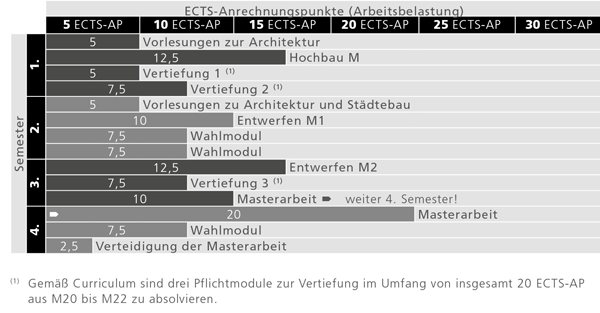Masterstudium Architektur
Curriculum (2008W)
Diplom-Ingenieurin
Dauer/ECTS-AP
4 Semester/120 ECTS-AP
Studienart
Vollzeit
Unterrichtssprache
Deutsch
Voraussetzung
Bachelorabschluss/Äquivalenter Abschluss und Sprachnachweis
Fakultät
Fakultät für Architektur
Niveau der Qualifikation
Master (2. Studienzyklus)
ISCED-11: Stufe 7, EQR/NQR: Stufe 7
ISCED-F
0731 Architektur und Städteplanung
Studienkennzahl
UC 066 443
Ab dem Wintersemester 2019/2020 darf eine Zulassung zu diesem Studium nur nach dem neuen Curriculum erfolgen.
Informationen zum Curriculum (2008W)
Ab dem Wintersemester 2019/2020 darf eine Zulassung zu diesem Studium nur nach dem neuen Curriculum erfolgen.
Voraussetzung
Fachlich infrage kommendes Bachelorstudium an der Universität Innsbruck:
- Bachelorstudium Architektur
Kriterien zur Feststellung der Gleichwertigkeit:
Auch bei Abschluss eines anderen fachlich infrage kommenden Bachelorstudiums ist die Zulassung zu diesem Masterstudium möglich. Im Rahmen der Feststellung der Gleichwertigkeit wird jedenfalls die Absolvierung folgender Kernbereiche im Rahmen des abgeschlossenen Bachelorstudiums geprüft:
- 60 ECTS-AP aus dem Kernbereich Entwerfen und Gestalten
- 10 ECTS-AP aus dem Kernbereich Geschichte und Theorie
- 20 ECTS-AP aus dem Kernbereich Konstruktion, Material, Technologie
- 10 ECTS-AP aus dem Kernbereich Städtebau und Landschaftsarchitektur
- 10 ECTS-AP aus dem Kernbereich Kunst und Kultur
- 10 ECTS-AP aus dem Kernbereich digitale und analoge Architekturdarstellung
Sollten auf die Herstellung der Gleichwertigkeit nur einzelne Ergänzungen (maximal 30 ECTS-AP) fehlen, kann die Zulassung mit der Auflage von Prüfungen, die im Rahmen des Masterstudiums zu absolvieren sind, verbunden werden.
Empfohlener Studienverlauf
Der unten angeführte, exemplarische Studienverlauf gilt als Empfehlung für Vollzeitstudierende, die das Studium im Wintersemester beginnen. Die Aufstellung dient der Darstellung eines möglichen Studienablaufs und ist nicht verpflichtend. Etwaige Prüfungswiederholungen bzw. deren studienzeitverzögernde Wirkung sind nicht berücksichtigt.
Die Regelstudienzeit beträgt 4 Semester bzw. 120 ECTS-AP, wobei gemäß Universitätsgesetz die Arbeitsbelastung eines Studienjahres 1.500 (Echt-)Stunden zu betragen hat und dieser Arbeitsbelastung 60 Anrechnungspunkte zugeteilt werden (ein ECTS-Anrechnungspunkt entspricht einer Arbeitsbelastung der Studierenden von 25 Stunden).
5,0 ECTS-AP: Vorlesungen zur Architektur
12,5 ECTS-AP: Hochbau M
5,0 ECTS-AP: Vertiefung 1 (1)
7,5 ECTS-AP: Vertiefung 2 (1)
5,0 ECTS-AP: Vorlesungen zur Architektur und Städtebau
10,0 ECTS-AP: Entwerfen M1
7,5 ECTS-AP: Wahlmodul
7,5 ECTS-AP: Wahlmodul
12,5 ECTS-AP: Entwerfen M2
7,5 ECTS-AP: Vertiefung 3 (1)
10,0 ECTS-AP: Masterarbeit › weiter im 4. Semester
20,0 ECTS-AP: Masterarbeit
7,5 ECTS-AP: Wahlmodul
2,5 ECTS-AP: Verteidigung der Masterarbeit

(1) Gemäß Curriculum sind drei Pflichtmodule zur Vertiefung im Umfang von insgesamt 20 ECTS-AP aus M20 bis M22 zu absolvieren.
Erweiterung des Studiums
Im Rahmen dieses Studiums kann das Erweiterungsstudium Entrepreneurship im Umfang von 45 ECTS-AP oder das Erweiterungsstudium Informatik im Umfang von 60 ECTS-AP absolviert werden. Die Zulassung zur Erweiterung setzt die Zulassung zu einem oder den bereits erfolgten Abschluss eines ausgewählten Studiums voraus. Weitere Informationen sind abrufbar unter:
Informationen zur Prüfungsordnung inkl. Bewertung und Benotung
Prüfungsordnung
Die Prüfungsordnung ist integraler Bestandteil des Curriculums, detaillierte Informationen finden Sie unter dem Paragrafen Prüfungsordnung.
Bei der Notenverteilungsskala handelt es sich um die statistische Darstellung der Verteilung aller positiv absolvierten Prüfungen, die innerhalb eines Studiums bzw. eines Studienfaches (unter Heranziehung aller gemeldeten Studierenden eines Studiums bzw. eines Studienfaches) erfasst wurden. Die Notenverteilungsskala wird in regelmäßigen Abständen aktualisiert.
| A | B | C | D | E |
|---|---|---|---|---|
| Österreichische Notenskala | Definition | %-Satz | ||
| 1 | SEHR GUT: Hervorragende Leistung | 46,5 | = 100% | |
| 2 | GUT: Generell gut, einige Fehler | 31,3 | ||
| 3 | BEFRIEDIGEND: Ausgewogen, Zahl entscheidender Fehler | 15,4 | ||
| 4 | GENÜGEND: Leistung entspricht den Minimalkriterien | 6,8 | ||
| 5 | NICHT GENÜGEND: Erhebliche Verbesserungen erforderlich, Erfordernis weiterer Arbeit |
Dezember 2021
Gesamtbeurteilung der Qualifikation
Nicht zutreffend
Erklärung: Eine Gesamtbeurteilung (mit Auszeichnung bestanden, bestanden, nicht bestanden) wird nur über eine studienabschließende Prüfung, die aus mehr als einem Fach besteht, vergeben (im Curriculum dieses Studiums ist diese nicht vorgesehen).
Formulare
- Prüfungsprotokoll
- Anmeldung der Masterarbeit
Bitte 1-seitiges Exposé beifügen, in dem Inhalte und Methoden der geplanten Masterarbeit kurz dargestellt sind.
Inhalt Exposè: Der Anmeldung der Masterarbeit beizulegen ist ein formloser Abstract, in welchem die geplante Masterarbeit kurz beschrieben wird und der architektonische Bezug klar formuliert wird. Anzugeben ist, ob es sich um eine theoretische Arbeit oder um einen Entwurf/Projekt/Installation handelt. Weitere Angaben: verkürzte Bibliographie (5 wichtigsten Werke) im Falle der theoretischen/wissenschaftlichen Arbeit, bzw. Referenzprojekte/Referenzbauten (5 wichtigsten) im Falle der Projektarbeit.
- Anmeldung zur kommissionellen Abschlussprüfung
- Ansuchen um Anerkennung von Prüfungen UND Beiblatt
- Deckblatt der Masterarbeit
- Eidesstattliche Erklärung (der Masterarbeit beifügen)
- Einreichung der Masterarbeit
- Sperre der Masterarbeit
- Antrag um Zulassung zur dritten und vierten Wiederholung einer Lehrveranstaltungsprüfung
Äquivalenzlisten
Kontakt und Information
Prüfungsreferat
Standort Technikerstraße 17
Studiendekanin
Univ.-Prof. Dipl.-Ing. Karolin Elisabeth Schmidbaur
